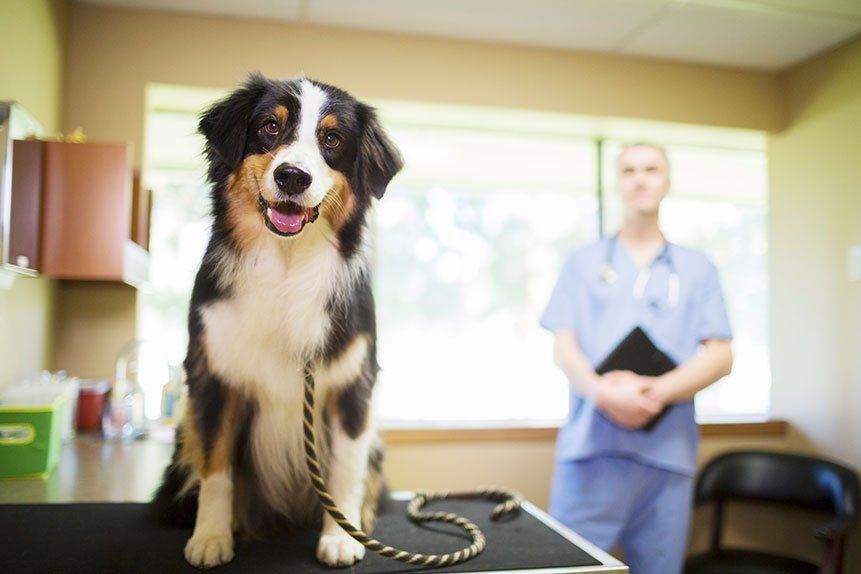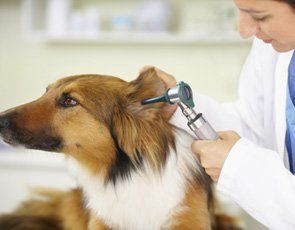
Canine parvovirus (or just parvo) is an extremely contagious disease that any dog can get, but puppies in particular are most susceptible due to their young immune systems. The illness is gastrointestinal in nature and can be fatal if not treated early in your young dog.
Canine parvovirus is spread by infected dogs who come in contact with healthy dogs or if a person handles infected feces and goes around a healthy dog. Vaccinations to prevent canine parvovirus infection begin at less than two months of age and are given in a series of shots until a puppy reaches around four months old.
If your puppy is exposed to canine parvovirus in any way, they can become infected and will quickly become ill, especially if your dog has not received their full series of vaccinations for the virus. The following are signs your puppy has parvo. If any of these signs apply to your young pup, take them to the vet right away for diagnosis and treatment. Parvo can be fatal if not treated within 48 to 72 hours.

If you're a cat owner, you will want your feline friend to enjoy good health and contentment for a lifetime. The first step to ensuring you pet's good health is to schedule routine wellness exams. The veterinarian will examine your cat and offer helpful advice. In addition, you can care for your furry feline companion in many different ways, including the following.

When busy pet owners don't have to stress about important grooming tasks, they enjoy more leisure time with their dogs. However, many dogs are terrified of grooming visits, especially if they've never been properly groomed before. Here are some methods to engage with your dog before visiting the groomer.

Not all pet owners know this, but dogs can develop dental problems just like people. Dog owners who are aware of the many dental problems that dogs can develop can make the effort to protect their dogs from painful, unpleasant dental conditions. This FAQ will help educate dog owners about the many problems that can develop if a dog's teeth are not cleaned regularly.

You love your dog or cat, and you only want to do what is best for them. Some pet owners avoid spay and neuter procedures because they don't want to cause their pets pain or because they've heard rumors that these procedures are unsafe.
While your intentions to protect your pet are noble, they are a bit misplaced. In almost all cases, spaying or neutering your pet really is the best choice - for you, for your pet, and for the animal population as a whole. These three key facts about spaying and neutering will show you why this is the case.

According to the U.S. Food & Drug Administration, heartworms have been reported in dogs in all 50 states, which means all dogs are at risk of contracting heartworm disease. Heartworms, or Dirofilaria immitis
, are transferred from infected mosquitoes to your beloved pet when the insect bites your dog.
A pup with heartworms can suffer heart failure, organ damage, lung disease and even death. Since you likely won’t know that your canine has had any contact with an infected mosquito, learn all you can about heartworms and how to prevent them. After all, prevention is the most important thing you can do.

No matter what you do, the fleas just seem to come back. You don't know why
the fleas are coming back, just that they are. Are they being brought in from outside? Hiding somewhere in the home? The source of your flea problem might simply be that you're overlooking something important. Here are some things you might want to ensure you’re doing:

Your dog was a joy as puppy and source of fun, help, and comfort as an adult, but now that your dog is getting older, you might be wondering how you can help them make the adjustment.
Dogs who have spent their whole life loving and serving your family deserve the best treatment as they age. Here are some simple things that you can change on a daily basis to assist your dog as they age with grace.
Dogs who have spent their whole life loving and serving your family deserve the best treatment as they age. Here are some simple things that you can change on a daily basis to assist your dog as they age with grace.

Kennel cough is a fairly common health condition among dogs and accompanied by a dry, hacking cough. Dogs with this illness may cough all day, especially if they are doing extra activity. Although it can be quite a nuisance, kennel cough is rarely life-threatening. If your dog was diagnosed with this cough, you should make him as comfortable as possible.
Here are seven useful tips for caring for a dog with kennel cough.

Cats can have two or three litters
of kittens per year if they have not been spayed. If you have a female cat that has not been spayed and you find out she's expecting, it can be a little alarming and exciting all at once. While you watch your cat's belly swell and her personality take on some unusual changes, you will probably have one big question in mind: When will she have her kittens?
Technically, a cat is pregnant for 63 to 65 days
. However, if you are like most pet owners, you won't know the exact time your cat got pregnant; you will only know when you started noticing your cat was pregnant. Therefore, it is helpful to get to know some of the signs that can come along just before your cat delivers her kittens.





















